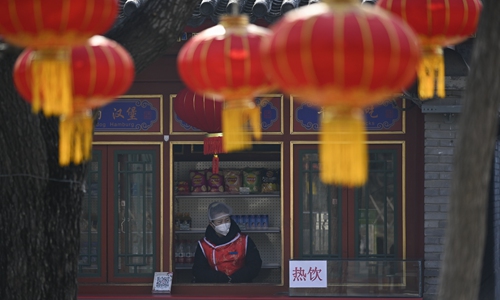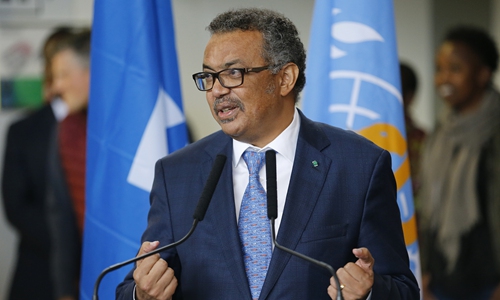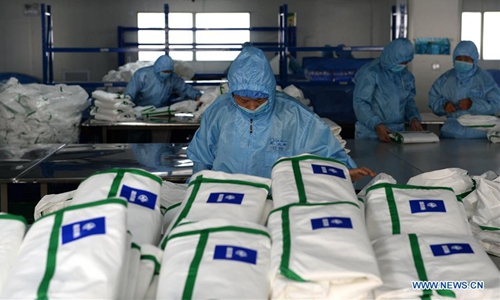HOME >> CHINA,SPECIAL-COVERAGE
WHO decision makes little effect in curbing China
By GT staff reporters Source:Global Times Published: 2020/1/31 21:43:41 Last Updated: 2020/1/31 23:01:06
US travel alert an overreaction, shows unilateralism: experts

A staff member, wearing a facemask, waits for customers near the Forbidden City in Beijing on Friday. The Chinese people have just experienced an unforgettable Spring Festival as the whole country has been forced to endure the spread of the novel coronavirus.Photo: AFP
The World Health Organization (WHO) declared on Thursday (local time) in Geneva the novel coronavirus outbreak a global public health emergency of international concern (PHEIC), putting pressure on China amid the deadly virus battle, as more countries are likely to issue travel advisories and impose trade restrictions.
Chinese analysts said although there is no need to exaggerate the impact of the declaration, the country needs to focus on containing the spread of the pneumonia as its top priority, as countries would adjust travel and trade policies based on the changing situation, and a complete recovery also depends on progress made during China's nationwide fight against the virus.
The WHO emphasized that the declaration was not a vote of no confidence on China. Over the past few weeks, the WHO has witnessed the emergence of a previously unknown pathogen, which has escalated into an unprecedented outbreak, and which has been met by an unprecedented response, WHO Director-General Tedros Adhanom Ghebreyesus said at a press conference on Thursday.
After considering multiple factors, WHO designated the coronavirus as a PHEIC. However, WHO continues to have confidence in China's ability to control the outbreak.
Following the PHEIC declaration, the US State Department warned Americans not to go to China, becoming the first country of issuing travel alert to its citizens, despite the WHO emphasized on Thursday that it did not suggest other countries impose travel and trade restrictions on China.
A US State Department notice said travelers should be prepared for travel restrictions with little or no advance notice. Commercial carriers have reduced or suspended flights to and from China.
Those currently in China should consider leaving using commercial means, it said, noting that the department has requested all non-essential US government personnel to defer travel to China because of the novel coronavirus. The travel warning is the highest Level 4 - Do Not Travel - in the US.
At least 98 novel coronavirus cases have been reported in 18 countries outside of China, including eight human-to-human transmissions in Germany, Japan, Vietnam and the US. The majority of the cases outside of China involved people who had traveled to Wuhan, or were in contact with someone who had visited the city, according to the WHO.

Tedros Adhanom Ghebreyesus, director-general of the WHO. Photo: VCG
Damage to both sides
The US travel warning may cause other nations to follow, considering its geopolitical influence, some Chinese analysts forecast, reminding other countries to heed the WHO advise.
The US is overreacting and the warning would greatly hurt global tourism and hinder people-to-people exchanges, Ni Feng, deputy director of the Institute of American Studies of the Chinese Academy of Social Sciences, told the Global Times.
Ni predicted that other Western countries may follow the US in issuing travel restrictions to China.
Zeng Guang, chief epidemiologist of the China Center for Disease Control and Prevention, noted that the US government's move shows its unilateralism, which is unsurprising.
The WHO clarified that they did not suggest other countries impose travel and trade restrictions on China. The advise was made based on multidimensional considerations and global public health interests, which the US ignored, Zeng told the Global Times.
The US government had ordered the departure of all non-urgent US personnel and their family members from Wuhan, Central China's Hubei Province, the coronavirus' epicenter, on January 23.
Some foreign airlines have suspended flights to China including Air Canada, United Airlines, British Airlines and IndiGo.
Imposing restrictions on personal exchanges between the US and China would significantly weigh on US interests in China, considering the huge presence of American companies in China, said Li Haidong, a professor at the Institute of International Relations of the China Foreign Affairs University.
"It may also trigger a humanitarian crisis, as American citizens have married Chinese people, and if they are forced to leave, many families would be separated," Li said.
Many US companies are becoming increasingly entrenched in China, including major US-listed firms such as Tesla, Starbucks, Apple and Boeing, therefore restricting personnel exchanges between China and the US would also have an impact on the US stock market, according to analysts.
The US government had also issued travel alerts on previous public health incidents declared by the WHO, including the H1N1 virus that caused an influenza pandemic in 2009, Ebola outbreak in West Africa and polio in 2014, media reported. During the Ebola outbreak, the State Department alerted US citizens to follow screening procedures and travel restrictions, and reduce air travel to countries including Guinea, Liberia, Sierra Leone and Mali.

People make protective suits at a medical company in Hefei, east China's Anhui Province, Thursday. To help fight the outbreak of pneumonia caused by the novel coronavirus, workers of some medical material companies rushed to work ahead of schedule to make protective equipment. Photo: Xinhua
Top priority
According to the International Health Regulations (IHR), if the WHO declares a PHEIC, the director-general shall issue temporary recommendations, including health measures regarding people, baggage, cargo, containers, conveyances, goods and parcels to prevent or reduce the spread of the disease and avoid unnecessary interference to international traffic.
However, temporary recommendations are non-binding advisories issued by the WHO and are on a time-limited, risk-specific basis, according to IHR.
When WHO declared the Ebola outbreak in the Democratic Republic of Congo as a PHEIC, the organization emphasized it was essential to avoid the punitive economic consequences of travel and trade restrictions on affected communities, in a statement published on its website in July 2019.
Under the IHR, countries implementing additional health measures going beyond what WHO recommends will be required to provide a public health rationale and justification within 48 hours of implementation for WHO to review, WHO spokesman Tarik Jasarevic told the Global Times on Thursday.
The WHO is obliged to share information about measures and the justification received with other countries involved, Jasarevic said, noting that countries are asked to provide public health justification for any travel or trade measures that are not scientifically based, such as refusal of entry based on suspected cases or unaffected persons to affected areas.
Chinese analysts said it was not necessary to overreact or interpret the news as a hostile attitude toward China from the global community. The shared priority is to prevent the deadly virus from spreading across the globe.
"Indeed, it may place extra pressure to China, with both economic and political implications," said Shen Yi, director at the Research Center for Cyberspace Governance of Fudan University.
"But it depends on how China continues fighting the epidemic in order to help its economy recover," Shen said, noting that the WHO decision has little influence on how other countries handle economic ties with China amid the pneumonia outbreak.
Posted in: SOCIETY,FOCUS